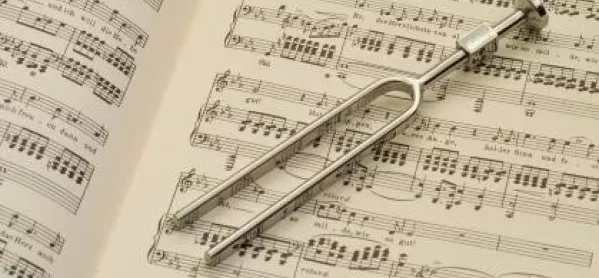Primary music - Turn up tune in

Want to start a choir? All you need is your voice and enthusiasm - you do not need a piano or the ability to play one. If you know someone who’ll come along and play for you, great, but it’s not vital.
Many song books now provide CDs with the songs sung on them and accompaniments for when you don’t need the back up of extra voices.
If you’re not confident about singing in front of children I guarantee you’ll find a child who’ll do it for you; just let them listen to the CD a few times with you. So, how do you do it:
- Decide on songs you like, know well and feel (reasonably) confident to teach. Make sure that there’s a variety of pace.
- Practise singing them in front of the mirror until you get over self- consciousness - it’ll be worth it.
- Choose a time when there’s no sports club running (especially football).
- Put up a bright poster with clear details of time and place, and announce it in assembly.
- Be there before the children with the words on an overhead or on the whiteboard.
- Never cancel choir.
Always start with a few warm-ups and make them fun: exercises, stretches, claps, tongue twisters or face pulling. I particularly recommend “Boom Chicka Boom”, which you can find in the Sing Up magazine (free to all primary schools when you register on the Sing Up website: www.singup.org). Let children lead it by choosing a voice.
Do you want the boys? You need to drag them off the playground. Be proactive: get out there and pick a few to invite personally. Persuade them to try it for a couple of weeks. Don’t give up.
Make sure you’ve got a strongly rhythmic song that will lend itself to drumming and get a couple of the boys to take turns in drumming along - few can resist that.
Find a cool character who is willing to sing a line on his own. And make sure you perform to the school, or at least a class, as soon as you’ve learnt a song well - they will feel good about it and see a purpose for their practising.
If you don’t want to put on a full-scale concert, do at least invite parents to an informal sing at the end of a term, it will provide another chance to perform and build esteem.
Keep choir interesting - don’t always sing in straight lines; make a circle, dance and do actions. Gospel songs are great for singing in a circle with movement and clapping.
Let small groups take it in turns to sing to the rest - another chance for performance in a safe situation. Lead the applause, always make positive comments about how they’ve listened and performed together. End on a positive note, congratulating them on what they’ve achieved and finishing with something you know they’ll sing successfully.
Finish with a smile, even if it’s only because you’re relieved it’s over. Have fun.
There’s no more enjoyable way (except doing much the same with your whole class) of getting children involved in music and responding to the government drive to boost singing in schools.
A few songs I’ve found to be winners are:
- “Frere Jacques”. Make up your own words, my children love Harry PotterWhere’s he goneRun off with HermionePoor old Ron from Flying a Round, published by Aamp;C Black. Singing rounds is the best way to get into part singing.
- “Swing Low, Sweet Chariot” with gospel choir-style swaying and swinging.
- “My Fantasy Football Team” from Sing Up magazine.
- “Halima Pakasholo”, also from Sing Up. It’s better if you add drums.
- “Living and Learning” in Songs for EVERY Assembly from Out of the Ark music. They have great songs plus good quality CDs. Visit www.outoftheark.co.uk. This is also good for drumming.
- Africa Rocks - a musical full of great songs for singing, dancing, drumming, actions - by Laurie Lewin. Look at www.wave7music.co.uk.
- Also use the Music for Youth materials. Visit www.mfy.org for more information
Gill Chalkley teaches at Withycombe Raleigh C of E Primary School in Exmouth, Devon, and won the BT award for teacher of the year in a primary school in the South West of England in 2007. She runs a choir of 130 pupils at her school, nearly half of whom are boys.
Keep reading for just £1 per month
You've reached your limit of free articles this month. Subscribe for £1 per month for three months and get:
- Unlimited access to all Tes magazine content
- Exclusive subscriber-only stories
- Award-winning email newsletters